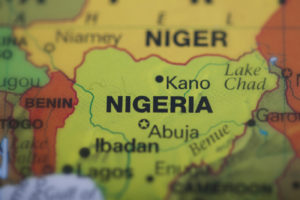NFL players call attention to religious persecution in Nigeria
(RNS)—A group of NFL players sent a letter to Capitol Hill on Dec. 19, urging U.S. leaders to take steps to curb violence against religious groups in Nigeria, including Christians.
“As current and former NFL players who care deeply about justice—here in America and around the world—we are grieved and outraged by the mounting violence, and we write to urge you to act now to confront religious persecution in Nigeria and ensure that those responsible are held to account,” the players stated in the letter.
About 60 current and former players signed the letter, addressed to President Donald Trump, House Speaker Mike Johnson, Senate Majority Leader John Thune, House Minority Leader Hakeem Jeffries and Senate Majority Leader Chuck Schumer.
Among the signers were star players like quarterback C.J. Stroud of the Houston Texans, Brock Purdy of the San Francisco 49ers and Treveyon Henderson of the New England Patriots, a leading candidate for Rookie of the Year.
Hall of Fame coach Tony Dungy also signed, as did Kirk Cousins of the Atlanta Falcons, Jameis Winston of the New York Giants, and three-time Super Bowl champion Devin McCourty.
Prompted by reports of religious violence
Benjamin Watson, an author and podcaster who played 15 years in the NFL, helped organize the letter in his role as editor-in-chief of Sports Spectrum, a faith and sports media company.
Watson said the letter was prompted in part by recent news of religious violence in Nigeria, including the November kidnapping of more than 200 children from a Catholic boarding school. That attack is part of a large pattern of violence against religious groups in Nigeria.
Since 2009, the U.S. Commission on International Religious Freedom has urged the U.S. Department of State to designate Nigeria as a “country of particular concern” because of the ongoing violence.
“Perpetrators of the violence have attacked religious sites, including churches and mosques, kidnapped or killed religious leaders, and—in some cases—used violence or threats of violence against religious communities while demanding so-called taxes, invoking Shari’a law as justification,” according to a commission report from July.
According to the report, government-enforced blasphemy laws and attacks by bandits, Muslim insurgents and gangs have created “significant restrictions on freedom of religion or belief.”
“This violence severely restricts religious practice and observance by Christians, Muslims, and traditional religious communities across many Nigerian states in the Middle Belt and in the northeast,” according to the report.
Recommendations for U.S. action
Watson said players want to see U.S. leaders do more to address the violence against religious groups, including imposing sanctions and sending more humanitarian aid to victims of violence.
The letter, which notes that a number of NFL players come from Nigerian families, includes a list of seven recommendations for U.S. government actions. The list was compiled with the help of NGOs and aid groups working in Nigeria, as well as nonprofits that assist persecuted Christians.
“We came together with the idea to lend our voice in urging the president and Congress to keep pressing them to deliver sanctions, to provide humanitarian aid,” Watson said. “We want to show that we’re amongst the people who care and want to stand up with our brothers and sisters who are suffering in Nigeria.”
The letter is a first for Sports Spectrum, a 40-year-old publication focused on sports and faith. While players involved with the publication have spoken out in the past on issues like racial reconciliation, the need for clean water and other concerns, the group never issued a letter to U.S. political leaders.
Watson said he hopes the message will reach not only politicians, but also the fans who read the publication. He said the violence in Nigeria should concern everyone.
‘This was a moment where we had an opportunity to speak about justice and about kindness and about caring for our neighbors in a way that, right now, has been in the news,” he said.
‘We want to do all we can do’
Steve Stenstrom, a former NFL quarterback and president of Sports Spectrum, said that the kidnapping of school children in Nigeria hit home.
“We want to do all we can do, as if it were our own families and our own kids who were at those schools and in those churches and in those villages,” he said.
There’s been pushback from some fans in recent years against athletes, especially in the NFL, for taking public stands on social issues. Most notably, former NFL quarterback Colin Kaepernick claimed NFL owners colluded to ban him from the league after Trump criticized him for kneeling during the national anthem. Kaepernick eventually reached a settlement with the league.
Stenstrom acknowledged that these are polarizing times but said some issues transcend politics.
“This isn’t a left or right issue,” he said. “It’s a life-or-death issue for people on the ground.”
In their letter, the players said they felt a moral responsibility to speak up.
“We ask you, as leaders of this nation, to use the full weight of your offices to defend the fundamental right to live and worship freely and to send a clear message that the United States will not stand by while Nigerians are targeted, terrorized, and killed because of their faith,” they wrote. “The lives at stake cannot wait.”



 The Nigerian president’s declaration of a “national emergency” represents a dramatic reversal for an administration that previously characterized violence as localized in a few isolated regions within the country, said Gideon Para-Mallam, an evangelical pastor and peace advocate in Nigeria.
The Nigerian president’s declaration of a “national emergency” represents a dramatic reversal for an administration that previously characterized violence as localized in a few isolated regions within the country, said Gideon Para-Mallam, an evangelical pastor and peace advocate in Nigeria. “To us in Africa and the Baptist family, the peace, stability, and prosperity of Nigeria is a blessing to the entire continent,” the AABF statement said. “We therefore appeal to all the parties concerned to embrace peace for the good of all.”
“To us in Africa and the Baptist family, the peace, stability, and prosperity of Nigeria is a blessing to the entire continent,” the AABF statement said. “We therefore appeal to all the parties concerned to embrace peace for the good of all.”